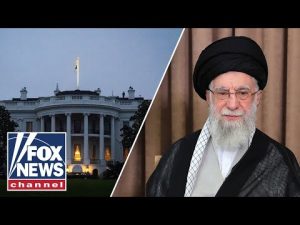In the high-stakes world of international politics, the tension surrounding Iran’s nuclear ambitions is reaching its peak. The entire globe seems to be holding its breath, watching President Trump and wondering what move he will make next. As he stands poised at the White House, he’s keeping everyone guessing, not too hasty in his decision-making, yet not entirely silent either. It’s as if the entire situation is a game of high-stakes poker, with Trump sitting at the table deciding whether to go all in or fold.
The potential benefits of a strategic strike against Iran’s nuclear facilities are tantalizing for those who favor decisive action. Flattening their nuclear ambitions could potentially lead to a regime change, swinging the Middle East’s delicate balance of power. With Iranian citizens reportedly struggling to make ends meet, straying from an oppressive regime might be a tempting solution for them. If Iran were to shift loyalties away from powers like Russia and China, it could send geopolitical shockwaves far and wide.
However, every poker game has its risks, and the risks here are as daunting as the stakes are high. What if Iran decides to retaliate, targeting American interests worldwide? This could very quickly escalate into a broader conflict involving the U.S. military on multiple fronts. An uptick in hostility could disrupt global oil supplies, possibly sending prices soaring. One misstep, and the world could be watching an ever-widening conflict unfold, affecting everyone far beyond the Iranian border.
Navigating this complex landscape is as fragile as a walk on a tightrope. Supporters of Israel argue that standing by their side is a necessity, while others suggest pursuing diplomatic paths, even though such roads appear to be blocked by stone walls. Many experts believe that inaction could spur Iran to sprint toward nuclear armament, seeing this as their only viable deterrent against rest-of-the-world bullying, ensuring a perpetual game of cat and mouse.
Among the swirling uncertainties of a post-strike Iran, the absence of a strong opposition leader presents a conundrum. A power vacuum could open a gateway for heightened chaos or present the slim chance of democracy taking root, albeit seemingly improbable to many. While it would be easy to pine for a fresh start, the grim reality is that, without someone competent to pick up the reins, there’s a risk of simply trading one oppressive regime for another – perhaps one better at maintaining a grip with even less care for human rights.
At the heart of these discussions lies a core question of pragmatism versus idealism. Should President Trump make a bold, potentially history-altering decision, or opt for patience, maintaining the status quo while seeking safer diplomatic routes? It’s clear that every option carries weighty consequences, each possibility carrying both hope and peril in equal measure. The world watches to see if he’ll choose to ride the waves of—Grave politics! Grab your popcorn, folks.







